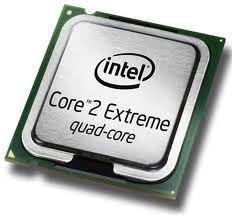What are all these strange computer terms?
Have you been baffled by all the strange computer terms that float around the industry? How about when you are planning to buy a new computer? Does the salesman talk geek speak? Well, there are a lot of unfamiliar terms in any business field and no-one can expect to know all of them. So if you are only interested in buying a new computer and getting a good deal this is what you need to know.
Lets put the terms in perspective. There are basically three things that you need to know about the inside of a computer, the processor, the size of the memory and the size of the hard drive.
The Brains
 First, the processor. The processor is the thinking part of the computer. Typically, in the old days, the speed was how a processor was judged. The faster the speed, the better the processor. For an example 1.8 GHz, 2.4 GHz, 3 Ghz are all typical processor speeds and usually the higher the number the better (1 gigahertz (GHz) equals 1,000,000,000 cycles per second). But, in the last few years we have gotten more options, dual and quad processors, 32 bit v.s. 64 bit processors. Again, but not to over simplify things too much, the bigger the number the better. The processor I have in my HP computer is an AMD Athlon IIX4, which is a quad core processor, which means I have a 4 core processor, which means I basically have a processor that can do 4 things at once, or to stretch the truth I can think of it as 4 computers in one. My processor also is 64 bit. What does that mean? It means it can move around twice as much information then a 32 bit processor can in the same amount of time.
First, the processor. The processor is the thinking part of the computer. Typically, in the old days, the speed was how a processor was judged. The faster the speed, the better the processor. For an example 1.8 GHz, 2.4 GHz, 3 Ghz are all typical processor speeds and usually the higher the number the better (1 gigahertz (GHz) equals 1,000,000,000 cycles per second). But, in the last few years we have gotten more options, dual and quad processors, 32 bit v.s. 64 bit processors. Again, but not to over simplify things too much, the bigger the number the better. The processor I have in my HP computer is an AMD Athlon IIX4, which is a quad core processor, which means I have a 4 core processor, which means I basically have a processor that can do 4 things at once, or to stretch the truth I can think of it as 4 computers in one. My processor also is 64 bit. What does that mean? It means it can move around twice as much information then a 32 bit processor can in the same amount of time.
The Memory
The second thing, and probably the more important thing, is the memory or RAM (Random Access Memory) inside the computer. You can think of your RAM memory as your desktop.  This is where the information is when you’re working on it. The more memory (RAM) the bigger your desktop and typically means you can have more programs and documents open at the same time. And the documents can be bigger and more complex. My newer computer has 6GB (1 gigabytes = 1,000,000,000 bytes /characters) of RAM, which is 6 times bigger than my old computer, and runs much faster. Actually, my newer computer has the capacity to have up to 16GB of memory, though I don’t think I will ever need it. What amount of memory is necessary? If you’re not a gamer 4-6GB is very adequate. But, the more the better!
This is where the information is when you’re working on it. The more memory (RAM) the bigger your desktop and typically means you can have more programs and documents open at the same time. And the documents can be bigger and more complex. My newer computer has 6GB (1 gigabytes = 1,000,000,000 bytes /characters) of RAM, which is 6 times bigger than my old computer, and runs much faster. Actually, my newer computer has the capacity to have up to 16GB of memory, though I don’t think I will ever need it. What amount of memory is necessary? If you’re not a gamer 4-6GB is very adequate. But, the more the better!
The Hard Drive
 On to hard drives. Hard drives are permanent storage/memory and are magnitudes bigger than RAM memory, but it much slower to access. The hard drive is like your file cabinet, it is where you save and retrieve data from. Oh, did I forget to mention that RAM is volatile, meaning you lose all the information that you are working on if you ever have a power failure, even for a spit second, and that you probably should get into the habit of saving your work in five to ten minutes intervals. My old computer has a 60GB hard drive, my newer one 650GB hard drive and I just recently bought a 1 Terabyte (1 terabyte (TB) = 1,000,000,000,000 bytes/characters) external hard drive for backups. What size of hard drive do you need? Well if you don’t spend your whole day down loading videos off of YouTube, anywhere around 500GB is probably sufficient. But, the bigger the better!
On to hard drives. Hard drives are permanent storage/memory and are magnitudes bigger than RAM memory, but it much slower to access. The hard drive is like your file cabinet, it is where you save and retrieve data from. Oh, did I forget to mention that RAM is volatile, meaning you lose all the information that you are working on if you ever have a power failure, even for a spit second, and that you probably should get into the habit of saving your work in five to ten minutes intervals. My old computer has a 60GB hard drive, my newer one 650GB hard drive and I just recently bought a 1 Terabyte (1 terabyte (TB) = 1,000,000,000,000 bytes/characters) external hard drive for backups. What size of hard drive do you need? Well if you don’t spend your whole day down loading videos off of YouTube, anywhere around 500GB is probably sufficient. But, the bigger the better!
Plus !
So what else might you want to know when buying your new computer? Make sure it has a DVD player and burner, that the power supply is at least 300Watts, and that it has enough USB ports for your input output needs. Oh, and did I mention you should probably play around with the stores demo computer to make sure the keyboard and mouse feel comfortable..
FYI
You can think of a byte equals 1 character
1 megabyte (MB) ) equals 1,000,000 bytes
1 gigabyte (GB) ) equals 1,000,000,000 bytes
1 terabyte (TB) equals 1,000,000,000,000 bytes
Hertz is equivalent to cycles per second, thus a gigahertz (GHz) equals 1,000,000,000 cycles/second.
Did you know modern supercomputers can typically do several trillion calculations per second.




